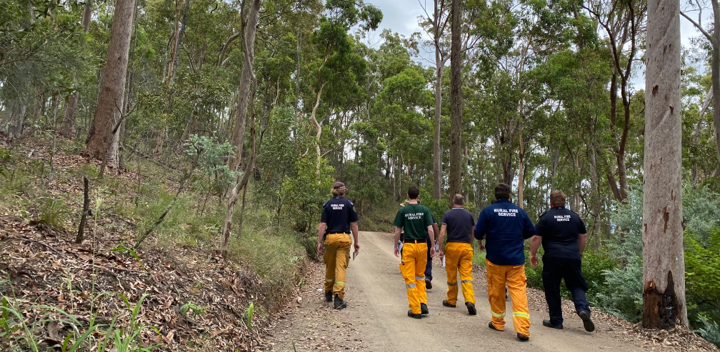
Fuel Hazard Assessment Training
Training Rural Firefighters to increase chances of controlling a bushfire.
 Training rural firefighters to rapidly assess fuel arrangement and its effect on the probability of controlling bushfires.This project aims to increase the knowledge of Rural Firefighters when making a rapid, visual assessment of fuel arrangement and gaining an understanding of how this will affect the chances of controlling a bushfire.
Training rural firefighters to rapidly assess fuel arrangement and its effect on the probability of controlling bushfires.This project aims to increase the knowledge of Rural Firefighters when making a rapid, visual assessment of fuel arrangement and gaining an understanding of how this will affect the chances of controlling a bushfire.
It will also provide practical application of the training in the field.
Healthy Land & Water’s Queensland Fire and Biodiversity Consortium (QFBC) is delivering the Overall Fuel Hazard Assessment Awareness Training to South East and South West Queensland Region Rural Fire Service volunteers.
This project focuses on:
- Provision of tools for rapidly assessing fuel arrangement and its effect on the probability of controlling bushfires.
- Hands-on learning via training field days in fuel assessment.
- Increasing knowledge of Rural South East and Southwest QLD Firefighters.
- Developing and distributing relevant training support material and learning collateral for participants.
What we are doing
 Delivering hands-on learning via training field days in fuel assessment.
Delivering hands-on learning via training field days in fuel assessment.
This project delivered through workshops, involved:
- Increasing the knowledge of South East and South West QLD Rural Firefighters when making a rapid, visual assessment of fuel arrangement.
- Helping them gain an understanding of how this will affect the chances of controlling a bushfire.
- Providing them with the necessary tools for rapidly assessing fuel arrangement and its effect on the probability of controlling bushfires.
- Teaching by learning on the field.
Measuring success
As a result of the program, the following has been achieved:
- Delivery of hands-on learning via training field days in fuel assessment.
- Delivery a rolling series of regionalised training workshops to QFES Rural Firefighters in overall fuel hazard assessment.
- Support materials and knowledge became accessible to QFES members and rural fire services volunteers.
- Delivery of workshops in consultation with QFES staff to ensure the project is on track, the scope is clear and any potential issues and/or opportunities have been identified.
- Providing participants with learning material (Overall Fuel Hazard Assessment Guide 4th Edition, field information sheets).
Why this project is important
|
Effective fire management is crucial to the preservation of life, property, and biodiversity in Rural South East and Southwest Queensland. The Queensland Fire and Biodiversity Consortium (QFBC) consists of a collaborative network of land managers and stakeholders who are committed to improving fire and biodiversity management, supporting applied fire research, facilitating partnerships, and building land manager and landholder capacity. It has been delivering Overall Fuel Hazard Assessment Training in partnership with QFES for over 12 years to increase the knowledge of Rural Firefighters when making a rapid, visual assessment of fuel arrangement, and gaining an understanding of how this will affect the chances of controlling a bushfire. |
Project snapshot
| Project name: | Overall Fuel Hazard Assessment Awareness Training South East and South West QLD |
| Project manager: | Jaime Kruusmaa, Healthy Land & Water |
| Catchments: | South East Queensland, South West Queensland and Central Queensland |
| Timing: | 2022-2023 |
| Partnerships: | This project is supported by Healthy Land & Water, through Queensland Fire and Biodiversity Consortium (QFBC) and by Queensland Fire and Emergency Services and the Australian Government. |
| Related articles: |
Project collaborators
This project is supported by Healthy Land & Water, through Queensland Fire and Biodiversity Consortium (QFBC) and by Queensland Fire and Emergency Services and the Australian Government.



